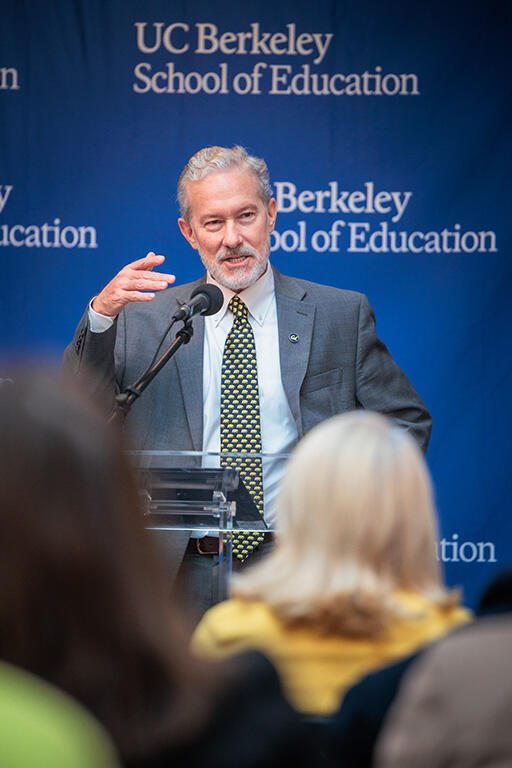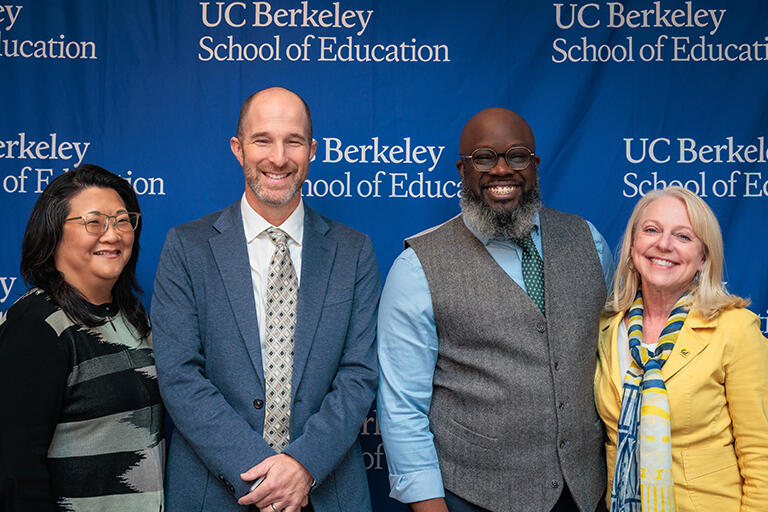Communication and collaboration between TK-12 schools systems and higher education institutions are critical components of preparing students for, and success in, post-secondary education.
That was the message from UC Berkeley Chancellor Rich Lyons; Associate Vice Chancellor and Dean of Enrollment Management and Undergraduate Admissions Olufemi “Femi” Ogundele EdD ‘24, and Berkeley School of Education Dean Michelle D. Young who spoke at a breakfast gathering of TK-12 school board trustees, principals, superintendents, school counselors, and Berkeley faculty.
“In the way we are thinking about our education involvement here as a public land grant institution, we share with you common cause and purpose, common dedication to advancing the greater good,” Lyons told the group. “Our institutions benefit – and the public we serve benefits – when we communicate, collaborate, and support one another. Let's commit to doing even more of that today.”
The event, hosted by the Berkeley School of Education (BSE), was also an opportunity to highlight resources; share how BSE and Berkeley faculty, students, and alumni are supporting local schools; and lay the groundwork for future partnerships.
The BSE has enhanced the leadership development of more than 60% of Bay Area schools. The teacher-leaders, site leaders and system leaders who have earned their degrees and credentials at Berkeley, and who engage in ongoing professional learning, continue to have significant impact in the local schools they serve.
“We know that the work of leadership is perhaps more difficult now than ever before, and the challenges just keep coming. Our program today has that top of mind,” Young said.
Among the main topics was sharing insights about the college admissions process, which has become increasingly more competitive.
UC Berkeley received a record number of applications for fall 2025 enrollment from first-year and transfer students (more than 150,000) and offered admission to about 20,100 students. Berkeley uses a holistic review process, taking into consideration academic factors and personal context.
“Being academically strong makes you eligible. That does not necessarily make you competitive. And that is the hard, hard reality of highly selective admissions,” Ogundele said. “No single factor in our review process truly determines admissions. We are interested in intellectual diversity. We are interested in different lived experiences.”
There is some disconnect between what higher education institutions are expecting of incoming students and what TK-12 schools are providing, Ogundele said.
“The feedback loop has been lost between higher ed and (T)K-12. And this is me reaching out. I'm not pointing fingers. I'm trying to lock arms and figure this out: what can we do in partnership together to better understand what's happening?” he said.
An example is if a student doesn’t have an Advanced Placement (AP) course on their transcript, the reasons could range from the student had a scheduling issue, to the school didn’t have enough AP teachers. But a college admissions officer may not know the circumstances by the transcript alone. Greater communication between the college and the high school could help put the student’s situation in context and make them competitive, he said, adding that everyone at the gathering is a champion of the students and invested in their success.
“And so how is it that we can make sure that our champions are singing the same fight song because it's the students that we're all fighting for,” Ogundele said. “If we're going to be all in, we have to make sure that we are communicating with each other on all sides.”
Also speaking at the meeting were Joshua Daniels JD ’08, MPP ‘08, chief of policy and governance technology services for the California School Board Association, and Rebecca Cheung, BSE’s assistant dean for leadership development programs.
“Informative event! Glad I made the time to come! Great presentation today!” were common refrains from participants who want to learn more about topics such as establishing and sustaining research practice partnerships; practicing strategic finance and responding to enrollment shifts; learning more about education research; and practicing equity centered governance.







Many school board trustees who attended the Oct. 23 event have Berkeley affiliations, including:
- Ty Alper, clinical professor of law, Berkeley Law (former Berkeley Unified School District)
- Laura Bratt, marketing and communications manager at The Magnes Collection (San Ramon Valley Unified School District)
- Alysse Castro, Education MA ‘03 (Alameda County Superintendent of Schools)
- Mike Chang, lecturer in the Department of Ethnic Studies (Berkeley Unified School District)
- Jen Corn, Education MA ‘10 (Berkeley Unified School District)
- Phil Kim, current BSE EdD student (San Francisco Unified School District)



